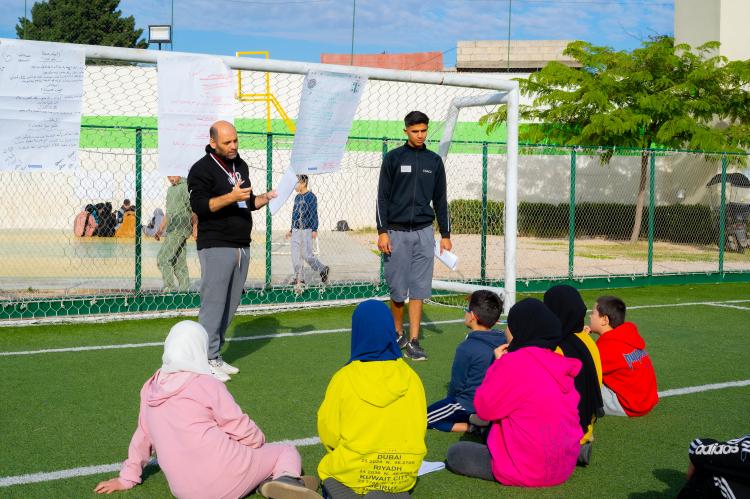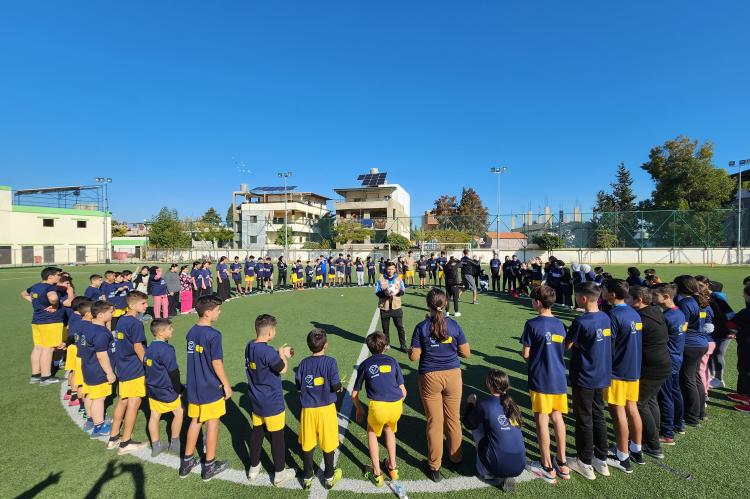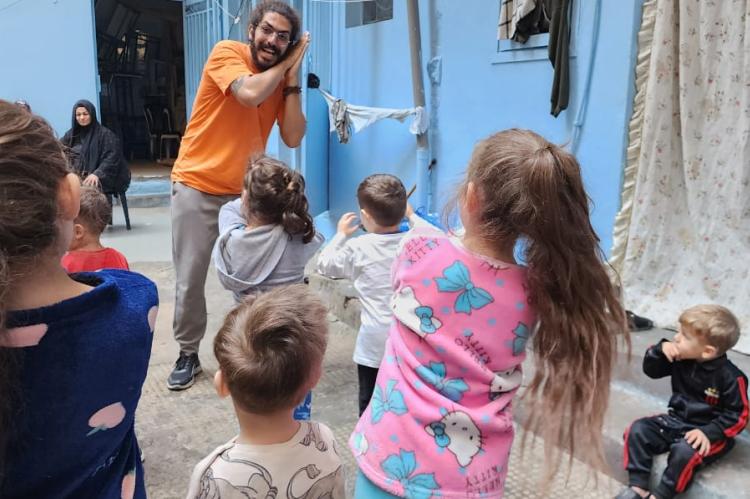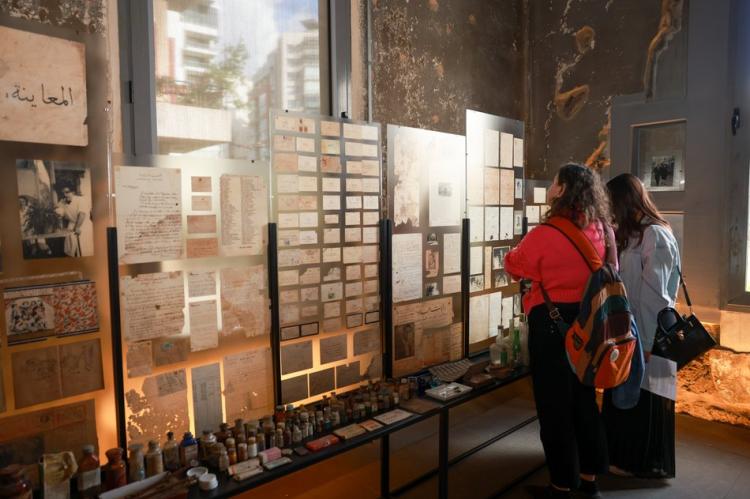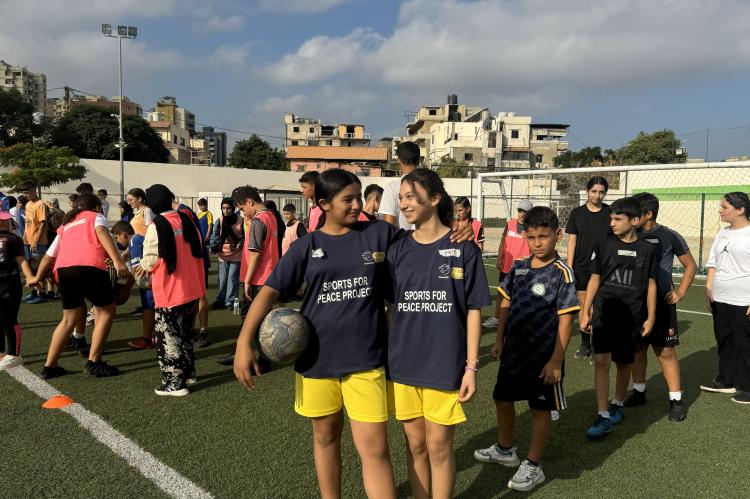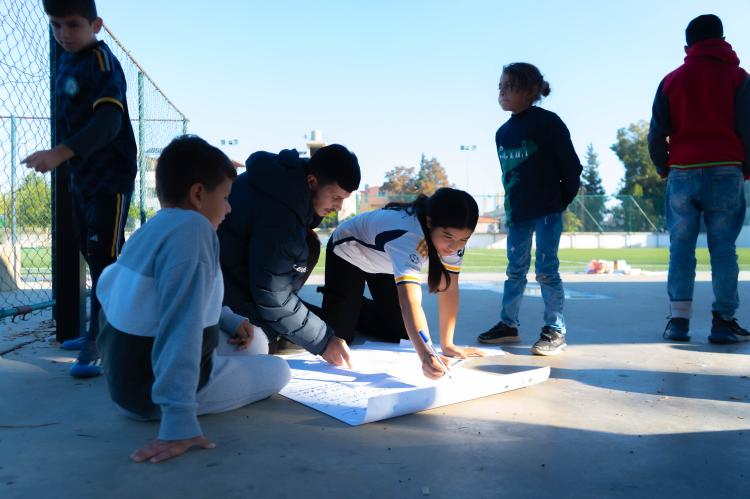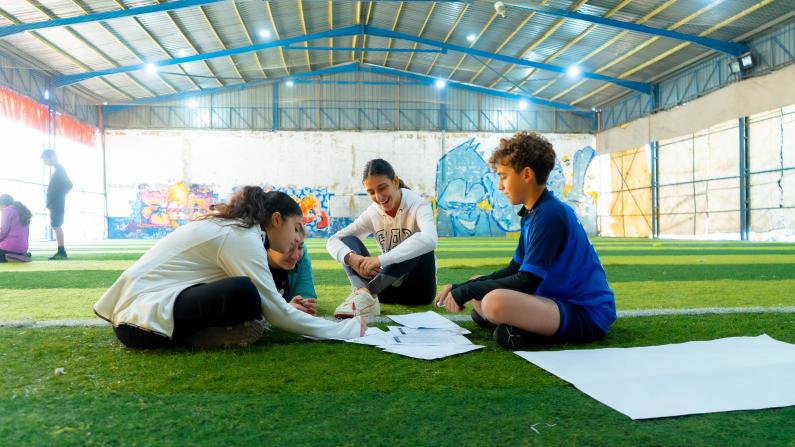
In a school parking lot in the North of Lebanon, where colorful laundry lines sway between the dusty cars, ten-year-old Sarah throws a ball toward a group of children. An hour earlier, she had sat quietly on the school steps, her shoulders hunched, her fingers twitching. Her eyes didn’t meet ours. But now - she’s smiling.
Sarah is one of 250 children participating in Sports for Peace (S4P), a project by Pro Peace Lebanon and our partner Al Midan NGO. The initiative brings together children from marginalized communities to play, breathe, and feel safe - if only for an hour each week.
S4P began in September 2023 as a pilot initiative for exploring how sports activities and peace education can work together for helping youth learn to handle conflicts. It fosters peace and conflict transformation by actively engaging and empowering young people, particularly those at risk of social exclusion, by encouraging a culture of dialogue and promoting core values such as respect, fair play, and teamwork.
For children and young people, sport can be an important outlet in challenging times.
Lebanon cannot find peace
The Lebanese people have been in survival mode for decades. The country endured a brutal 15-year civil war between sectarian and political groups, followed by repeated armed conflicts with Israel, including devastating invasions and bombardments. Add to that the spillover of regional wars - and absorbing millions of refugees - placing immense pressure on its already fragile infrastructure.
This long history of instability was compounded by a complete economic collapse beginning in 2019, triggered by years of deep-rooted political corruption and financial mismanagement. In 2020, the Beirut port explosion one of the largest non-nuclear blasts in modern history shattered an already weary population. Since then, Lebanon has faced years of political paralysis, and worsening living conditions.
In the latest war that broke out in September 2024, Israel targeted the south of Lebanon and southern suburbs of Beirut, triggering mass displacement, our partners were already drained - physically, emotionally, and mentally. Many had already lost homes, savings, and a sense of stability. And yet, somehow, they adapted quickly and stepped in - often while being directly impacted themselve - mobilizing emergency activities, offering psychosocial support, and showing up for others who had lost everything.
Sports and Creativity for Peace
Al Midan and Pro Peace transformed the existing S4P framework into an emergency response, offering the displaced families, like Sarah’s whose home in the South was reduced to rubble, psychosocial support through play and structured sports sessions in shelters in the North of Lebanon.
Following Israel's attack on southern Lebanon, Pro Peace and its partner organization converted the Sports for Peace project into an emergency aid program.
The children came withdrawn. Some hadn't spoken in days. Some hadn’t eaten properly in weeks. But with time, play replaced fear. A whistle blown in a dusty courtyard became a small promise: you're safe here, for now. One of the school directors shared “The families arrived with nothing but fear, they left their homes not knowing where they are going. These children needed to move, to scream, to laugh. They needed to feel alive again.”
Emotional first Aid through expressive Art
In Beirut, a different kind of healing was taking place. Laban, a social theatre troupe dedicated to community-based peacebuilding, refused to pause its work - even as drone strikes echoed around. With the support of Pro Peace, Laban created safe spaces where displaced children could express their emotions, start to process their traumatic experiences, and reclaim moments of play and joy.
In conditions where words often fail, children turned to colors, movement, and creativity to make sense of what they were feeling. “We must act fast,” said Farah Wardani, Artistic and Executive Director at Laban. “Families are sheltering in schools, and the demand for support is overwhelming”.
“The families arrived with nothing but fear, they left their homes not knowing where they are going. These children needed to move, to scream, to laugh. They needed to feel alive again.”
Laban’s sessions focused on trauma-informed care, expressive art, movement, and theatre - offering children not just a distraction, but a pathway toward processing their emotions. These activities became a form of emotional first aid and reminded children that their stories matter and that joy is still possible.
For members of Laban, it is an odd situation to help people living in shelters, while they themselves have been displaced and are living in other shelters “But finding meaning and supporting each other during this time is important” Farah explains, “And working on the ground gives us meaning.”
Frieden spenden
Vielen Dank für Ihre Unterstützung!
When War Remembrance and current War overlap
A third initiative, the exhibition "Hkeeli" ("Tell Me") at Beit Beirut - a building frozen in time since the Lebanese civil war - offered a different form of peace work: remembrance. Launched shortly after the ceasefire was declared in November, the exhibition marked 50 years since the start of another war: The Lebanese Civil War. The timing of this act of commemoration was painfully ironic - just months earlier, a war took hold of the country, with airstrikes still raging across the country despite a ceasefire in place. Visitors who came to reflect on a war that began half a century ago, some of which only recently returned to homes reduced to rubble in the latest round of violence. The dissonance was sharp. How does a society look back on one war, when the scars of another are still fresh?
Since November 2024, the exhibition “Hkeeli” has commemorated the outbreak of the Lebanese civil war 50 years ago. Shortly before the opening, war broke out again in Lebanon.
Yet this tension gave the exhibit its power. It reminded visitors that Lebanon’s past is not past at all, and that memory is as much about the present as it is about history. Hkeeli treated memory as a public responsibility, not a private burden. It seemed to resonate. On opening day alone, more than 1,000 people came. Since April 13, over 10,000 have walked through its doors.
Spread across the rooms of Beit Beirut, a series of installations invited visitors to move through memory not as observers, but as participants. The exhibit was built on encounters - with sound, silence, testimony, and time. You might hear a voice that sounds like someone you love. You might find a piece of yourself you thought you’d forgotten. You might finally understand your parent’s stories.
Inside those shell-riddled walls, visitors were asked to listen: to the families of the disappeared, to the reverberations of past wars, and to the haunting resonance of the current one. On one wall, hundreds of keys were hung - some from homes lost during the civil war, others newly donated by peacebuilders displaced in today’s war. A circle of loss that refuses to close.
“It’s hard to ask people to remember,” one guide shared, “when we’re still living through it. We never really stopped.”
The international Community has to decide
There’s a quiet contradiction woven into the fabric of this work. As bombs fall and homes crumble, funds also arrive. The same world that supports our peacebuilding efforts is, at times, complicit in the forces undoing them.
One of our partners put it bluntly: “We’re being asked to build peace while our homes are destroyed. We’re being funded to heal trauma created by the very same global system.”
Sport shows ways in which conflicts can be resolved through dialogue, fair play, and respect rather than violence.
We believe in the power of civil society. But peacebuilding cannot be separated from politics. It cannot be reduced to bandaging wounds inflicted by systems we refuse to challenge. This is why Pro Peace works not only in Lebanon but also in Germany. Because peace must be practiced here too - in debates, policies, responsibilities. We cannot claim to support nonviolence while remaining silent about the violence supported abroad. We must ask how we can truly support peace by critically engaging with policies that not only perpetuate but deepen the cycle of violence.
There’s a saying: El aamal howwe el dawa - “work is the remedy.” But it’s a bittersweet one. Because while working keeps you moving, it also delays the pain. Our peacebuilders are not superheroes. They are wounded, stretched thin, and grieving in motion.
This is how Lebanon copes. By doing. By filling the space where feeling might otherwise crush you. There’s no other choice. Grieve later - right now, someone needs help. A child needs a game. A stage needs a voice. A memory needs honoring.
The employees of Pro Peace and its partner organizations were also directly affected by the war. Nevertheless, they pushed ahead with the projects and drew hope from their work.
Lebanon’s history still bleeds into its present. But so does its unstoppable spirit. Lebanese people are ready to build a future, but we can’t do it alone. We need the world to stop contributing to our destruction and start supporting our right to live in peace.
German and European public must ask themselves: is peace truly being supported? Are the roots of war being addressed?
Billions of euros are spent on weapons that destroy the world our partners are trying to heal. Every policy that ignores the suffering of civilians tells children, like Sarah, that their pain is acceptable collateral.
Peace must remain in Motion
Peace is not a destination. It is a daily act. A community play in a crumbling theater. A girl’s laughter in a school parking lot. A key hung on a wall, waiting for the door to be opened again.
We’re still here. Still creating. Still hoping. Still throwing the ball.
Carole Maroun works in Pro Peace's Lebanon team.
